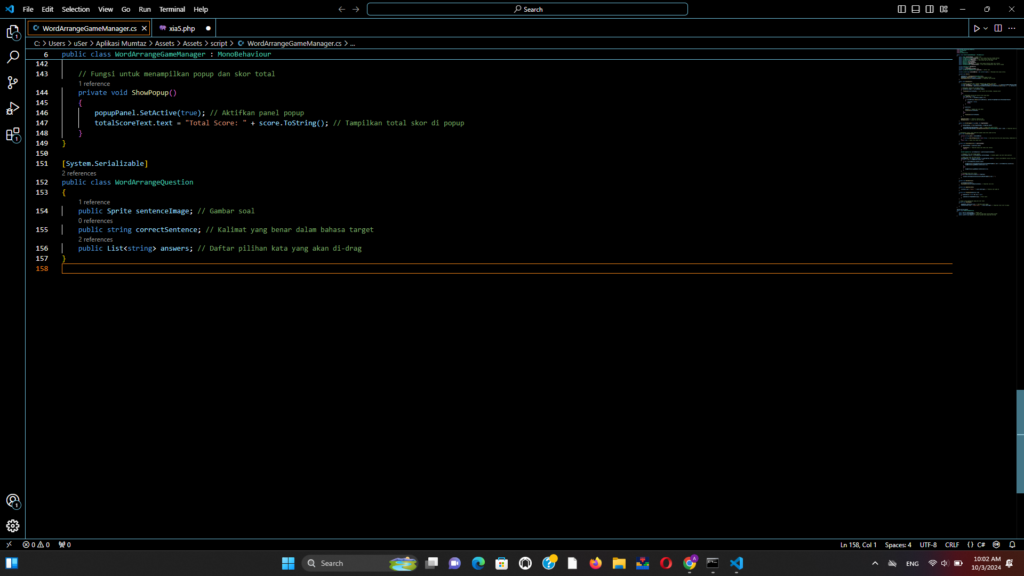Hello, fellow developers! My name is Jarwanto, and today I want to talk to you about something crucial in the world of software development: coding practices. As a programmer who has spent years working on web and software applications, I can’t stress enough how following solid coding practices can elevate your work from average to outstanding. Whether you’re just starting or are already a seasoned developer, adopting these practices will improve your code quality, maintainability, and collaboration with others.
So, let’s dive into the Top 10 Coding Practices Every Developer Should Know—from my perspective as a programmer who has learned these lessons firsthand!
Table of Contents
- 1. Write Clean, Readable Code
- 2. Follow the DRY Principle (Don’t Repeat Yourself)
- 3. Keep It Simple (KISS)
- 4. Use Meaningful Variable and Function Names
- 5. Version Control Your Code (Git)
- 6. Test, Test, and Test Again (Unit Testing)
- 7. Handle Errors Gracefully
- 8. Optimize Your Code
- 9. Document Your Code
- 10. Never Stop Learning
1. Write Clean, Readable Code
The first and foremost coding practice is to write clean and readable code. I’ve learned that if your code looks like a mess of random letters and numbers, nobody (including your future self) will want to read or maintain it. Here’s why this is important:
- Consistency: Stick to a consistent naming convention (whether it’s camelCase, snake_case, or kebab-case) throughout your project.
- Commenting: Adding meaningful comments helps others understand your thought process and purpose, but be careful not to over-comment on things that are self-explanatory.
- Refactoring: Regularly revisit your code and refactor it for simplicity and clarity. A piece of code that works is good, but a piece of code that works and is easy to understand is better.
I often think of it like this: If your code is readable enough that someone else can pick it up and immediately understand it, you’ve done your job right.

2. Follow the DRY Principle (Don’t Repeat Yourself)
One of the first lessons I learned as a developer was the DRY principle. Early on, I found myself repeating chunks of code in different places. Trust me, this only creates headaches later.
The DRY principle teaches you to avoid redundancy by encapsulating reusable code into functions, modules, or classes. This not only saves time but also makes maintaining your code easier because any update or bug fix only needs to happen in one place. Here’s how you can implement DRY:
- Functions and Methods: Break down large blocks of code into smaller, reusable functions.
- Modules and Libraries: Group related functions into modules or classes to be reused across your project.
3. Keep It Simple (KISS)
Another foundational coding practice is KISS, or “Keep It Simple, Stupid.” This principle is a reminder to avoid overcomplicating things. It’s easy to get carried away trying to implement fancy algorithms or frameworks when a simpler solution would work just as well.
From my experience, the simpler your code, the fewer bugs you will encounter, and the easier it is for others to contribute or maintain your code. So, the next time you’re tempted to add unnecessary complexity to your project, take a step back and ask yourself: Is this the simplest way to solve the problem?
4. Use Meaningful Variable and Function Names
In the early days of my coding career, I used to name variables like x and y, but soon realized this was a terrible idea, especially when working in larger projects. Descriptive variable and function names will make your code self-explanatory and save time during code reviews or debugging.
Instead of naming a variable a, call it userAge. Instead of naming a function foo(), use something like calculateUserScore(). Meaningful names make your code readable and maintainable.
5. Version Control Your Code (Git)
Imagine working on a massive project and accidentally deleting or breaking something crucial with no way to revert to an earlier version. Trust me, I’ve been there. This is where version control systems like Git come into play.
Using Git ensures:
- Backup: Every version of your code is backed up.
- Collaboration: Git allows multiple people to work on the same project without overwriting each other’s work.
- Branching: You can experiment with new features on separate branches without affecting the main project.
For me, learning Git was a game-changer. Now, it’s second nature to commit regularly and create branches for new features or bug fixes.
6. Test, Test, and Test Again (Unit Testing)
It’s tempting to skip testing, especially when you’re in a rush to deliver a project. But skipping testing is like driving a car without checking the brakes. You might get away with it for a while, but eventually, something will go wrong.
Testing doesn’t have to be complicated. Start with unit tests that check whether individual parts of your code (like functions or methods) work as expected. You’ll be surprised at how many issues are caught early with thorough testing.
From personal experience, I’ve found that adopting test-driven development (TDD), where you write tests before you even write the code, helps ensure that your code is robust and behaves as expected.

7. Handle Errors Gracefully
One of the worst things you can do as a developer is leave your code vulnerable to unexpected errors. Your program should never just crash or freeze without giving any feedback. Proper error handling improves the user experience and makes debugging easier.
Use try-catch blocks where necessary, return meaningful error messages, and log errors to track them later. This way, if something goes wrong, you’ll have a much easier time identifying and fixing the problem.
8. Optimize Your Code
As you gain more experience, you’ll start to realize the importance of performance optimization. Fast, efficient code isn’t just nice to have—it’s often essential, especially when dealing with large-scale applications or high-traffic websites.
Some optimization tips I’ve picked up along the way:
- Avoid unnecessary loops: Nested loops can slow down your application significantly.
- Leverage caching: Save frequently accessed data in cache to reduce processing time.
- Optimize database queries: Use indexing, avoid SELECT *, and batch your updates.
9. Document Your Code
When I first started out, I never bothered to document my code because I thought it was unnecessary. But when I revisited old projects months later, I often couldn’t remember why I wrote certain functions or how some parts of the code worked.
Proper documentation isn’t just for others—it’s for you, too. Make it a habit to write:
- Inline comments explaining tricky or non-obvious parts of your code.
- Function descriptions that clarify what each function does, its parameters, and return values.
- README files that provide a high-level overview of your project, including how to set it up and run it.
10. Never Stop Learning
The world of software development is constantly evolving, and as developers, we need to stay on top of the latest trends and technologies. Whether it’s learning a new programming language, mastering a new framework, or staying updated on security best practices, always be open to learning.

One of the ways I stay sharp is by engaging with the developer community. I frequently attend meetups, watch tutorials, and read blog posts from other experienced developers. Remember, coding is a journey, and the best way to grow is to continually seek out new challenges and opportunities to improve.
There you have it—my top 10 coding practices that every developer should know. By integrating these into your day-to-day coding routine, you’ll see your productivity increase, and your code will become cleaner, more efficient, and easier to maintain.
If you’re serious about leveling up as a developer, start by adopting these practices. Not only will they make your life easier, but they’ll also help you build better software that’s more maintainable and scalable.
Thanks for reading, and happy coding! If you’ve got any questions or thoughts on these practices, feel free to share them in the comments below. Let’s learn and grow together as developers.
– Jarwanto


